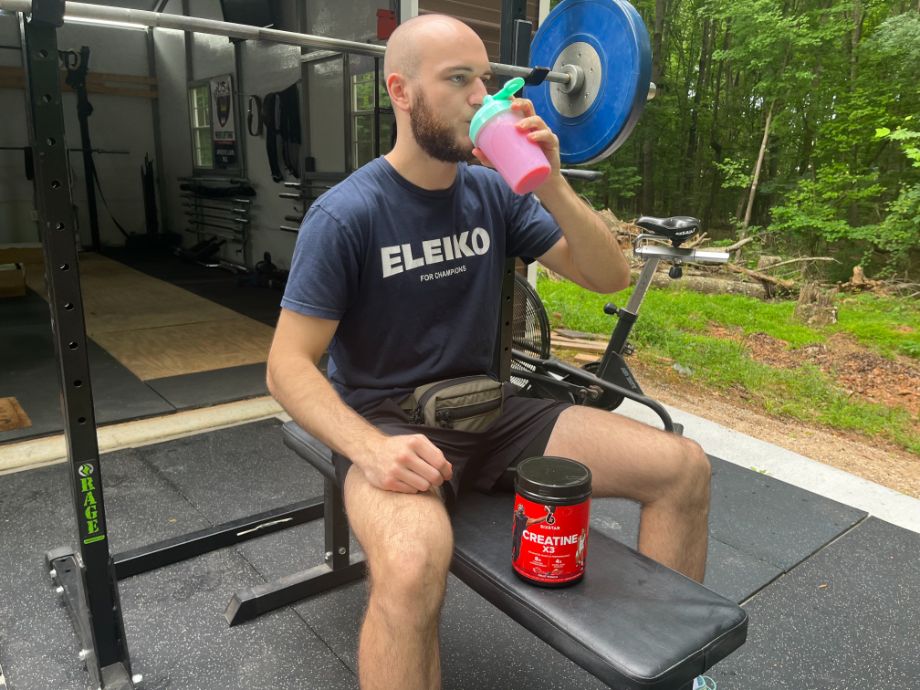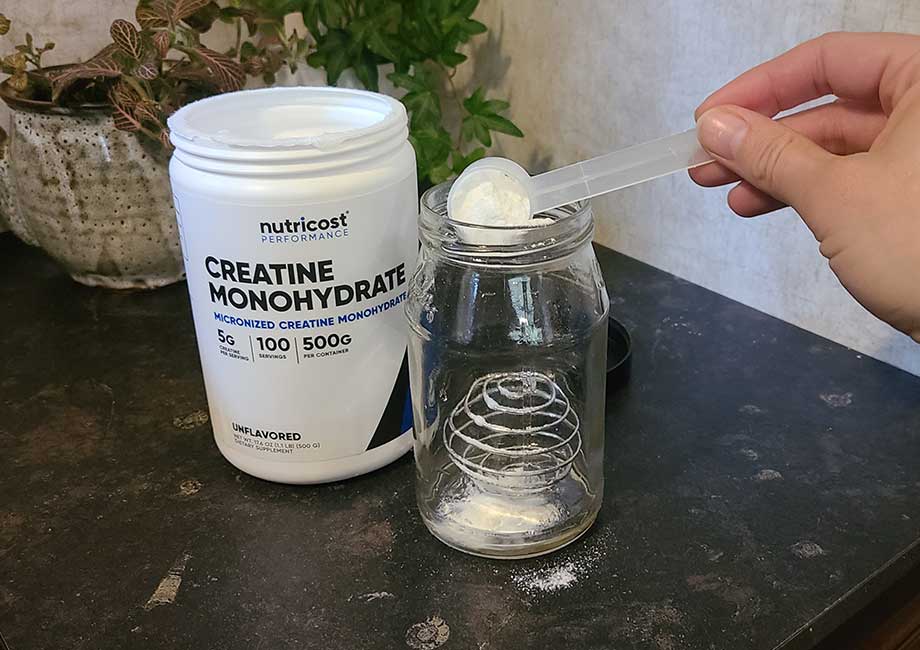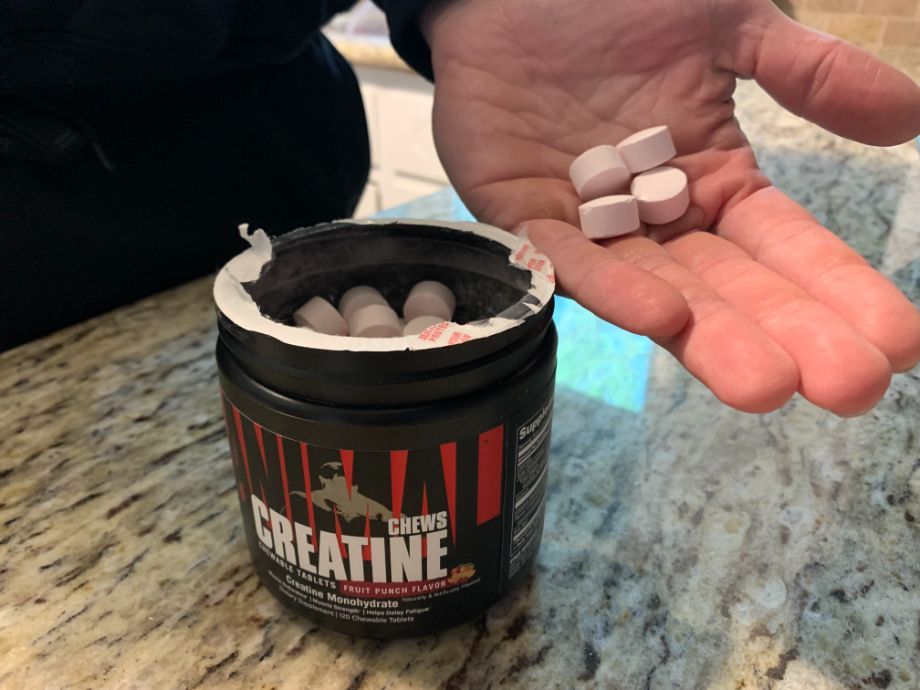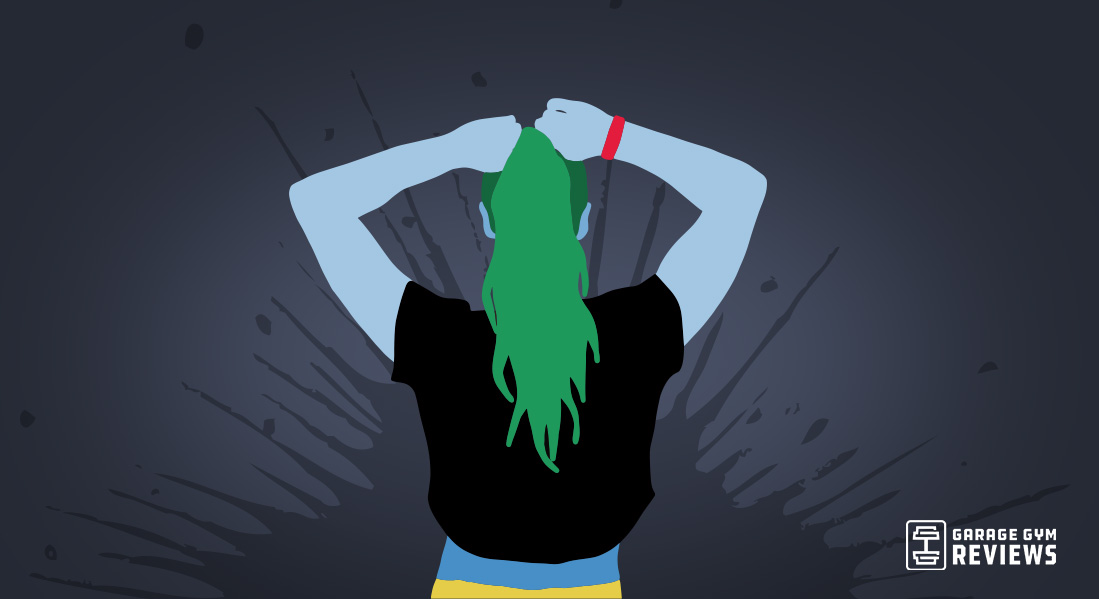We test and review fitness products based on an independent, multi-point methodology. If you use our links to purchase something, we may earn a commission. Read our disclosures.
When it comes to misunderstood supplements, creatine takes the cake. Many think it’s just a muscle-building supplement for men or those who want to get jacked, and others are concerned about potential side effects, like dehydration, kidney disease, and hair loss.
As fans of creatine supplementation, we want to put unwarranted concerns to rest. In this guide, we’ll dive into the science to answer the question, “Does creatine cause hair loss?” We’ll also dispel some other common myths about creatine so you can feel confident about adding it to your supplement routine (if you want to).
Medical disclaimer: This article is intended for educational and informational purposes only. It is not intended as a substitute for medical advice. For health advice, contact a licensed healthcare provider.

What Is Creatine?
Exactly what is creatine? Creatine is an amino acid, a naturally occurring organic compound that’s used to make proteins. It’s found primarily in your muscle cells—95% of the creatine in your body is stored in your skeletal muscle (mostly in the form of phosphocreatine), while the remaining 5% is divided up between the brain and testes1.
Your body can make creatine with the help of your liver, kidneys, and pancreas, and you can get it from red meat and fish. Of course, there are also creatine supplements—most commonly in the form of creatine monohydrate, which is the most highly bioavailable form2.
Functions of Creatine in the Body
On a high level, creatine gives your body energy and helps promote brain function and overall wellness. Your body uses creatine to create and replenish adenosine triphosphate3 (ATP) stores, the energy source your body relies on for muscle contractions and explosive movements4, like sprinting.
As such, many bodybuilders and athletes take creatine supplements to get through heavy lifting sessions or high-intensity exercise. And there’s a lot of evidence backing up their ergogenic value.
Studies show that taking creatine supplements can increase availability of the amino acid in the muscle1. This can contribute to positive training adaptations that lead to increases in muscle mass, strength gains, and overall improvements in performance.
Does Creatine Cause Hair Loss? What the Research Says
But while creatine has a lot of benefits, there are common questions that arise, like, “Does creatine cause hair loss?”
The short answer: No. In 2009, a relatively famous study that was published in Clinical Journal of Sport Medicine5 by van der Merwe et al., led to murmurings that creatine supplements could cause hair loss, but that’s not what the study showed.
For this study, researchers tested testosterone and dihydrotestosterone (DHT) levels in 20 male rugby players, and then split them into two groups. One group was given a daily dose of 25 grams of creatine and 25 grams of glucose for a week (this was the “creatine loading” phase). The other (the placebo group) was given 50 grams of glucose per day.

After the first week, each group was put on a maintenance dose: 5 grams of creatine and 15 grams of glucose for the first group, and 30 grams of glucose per day for the placebo group. Testosterone and DHT levels were measured again at the 7-day mark and a third time at 21 days. Body composition measurements were also taken.
Testosterone levels didn’t change during the study period, but DHT levels increased by 56% after the initial creatine loading phase. They stayed 40% higher than baseline during the 14-day maintenance period (when creatine supplementation was dropped down to 5 grams per day). Because DHT increased but testosterone levels didn’t, the DHT to T ratio also increased by 36% during the creatine loading phase and 22% during the maintenance phase.
But what does any of this have to do with hair loss? Good question.
DHT is an androgen (a sex hormone) and one of the main regulators of hair growth. It’s also connected to sebaceous gland function6 and prostate growth.
DHT is also a metabolite of testosterone. It forms when an enzyme called 5-alpha-reductase converts free testosterone into DHT. This DHT can attach to androgen receptors in some hair follicles, which can result in hair loss. And increased levels of DHT7 have been found in both men and women with androgenetic alopecia, or what’s more commonly known as “male-pattern baldness.”
While the volunteers in the aforementioned study didn’t actually experience any hair loss during the study period, the elevated levels of DHT were flagged as a potential cause of hair loss. However, a myth-busting report published in the Journal of the International Society of Sports Nutrition8 in 2021 called out some issues with this study.
The three major concerns were that:
- Free testosterone was never measured, and there wasn’t an increase in total testosterone at any point during the study period. In other words, creatine may have caused an uptake in the action of 5-alpha-reductase, meaning more DHT was created from the free testosterone that was already there, but overall levels didn’t necessarily go up.
- While the DHT to testosterone ratio increased, it still remained within normal clinical limits. In other words, the numbers weren’t really a cause for concern on their own.
- The group taking creatine had lower baseline levels of DHT than the placebo group to begin with. In fact, their levels were as much as 23% lower. DHT also decreased in the placebo group over the course of the study period. In other words, the results seemed more clinically significant than they were.
To add to that, there have been 12 other scientific studies investigating the effects of creatine supplementation on testosterone and potential resulting hair loss since the initial study was published in 2009. These studies used dosages ranging from 3 to 25 grams per day, and had study periods that lasted six to 12 weeks.

Two of them found very small (read: scientifically insignificant) increases in testosterone, and the others reported no changes.
All this to say that at the end of the day, there’s no scientific evidence that creatine use actually causes hair loss.
Other Side Effects of Creatine
But what about other side effects? There aren’t many to report.
Creatine is one of the most well-tolerated dietary supplements, even when taken in doses of up to 5 grams per day. The most common negative effect of creatine use is weight gain, but this is typically a byproduct of temporary water retention, not an actual increase in body fat.
Some people believe that creatine can cause heat intolerance, dehydration, and muscle cramps, but studies8 have debunked these theories, too.
There’s also no evidence that normal creatine supplementation has an adverse effect on kidney function in healthy people. But if you have an existing kidney disease, it’s a good idea to talk to your doctor before taking any supplement.
Does Creatine Cause Hair Loss? Final Thoughts
If you’re worried that creatine will make your hair fall out or give you a receding hairline, don’t be. This rumor gained traction due to one misinterpreted study done on college-aged rugby players in 2009 that has since been debunked. There’s no sound evidence that creatine causes hair loss, or any other major side effects, even when taken in doses of as much as 30 grams per day for 5 years1.
Does Creatine Cause Hair Loss? FAQs
Does creatine cause hair loss?
There’s no clear evidence that creatine can cause hair loss. The creatine myth that supplementing with creatine can lead to hair loss came from misinterpreted data regarding increases in DHT (dihydrotestosterone) levels over several weeks of usage. DHT is linked to some instances of hair loss.
Can creatine boost testosterone?
No, creatine doesn’t boost testosterone levels. While creatine supplements have been shown to improve athletic performance, this has nothing to do with testosterone levels—it’s a byproduct of ATP replenishment. The handful of studies that have looked at the effects of creatine on testosterone reported no significant increases.
Will my hair grow back if I stop taking creatine?
Yes, if creatine was, in fact, responsible for hair thinning or loss, discontinuing use should allow hair to regrow.
How do you fix creatine hair loss?
If you believe that creatine is causing hair loss, stop using it, and your hair should grow back. Many hair growth medications and treatments are available if this isn’t the case.
Is hair loss from creatine permanent?
All indications are that if creatine has caused hair loss, stopping use should allow the hair to grow back.
Does creatine cause acne?
There’s no scientific evidence showing that creatine causes acne. Often, creatine is confused with anabolic steroids, which can cause acne (and hair thinning), but the two are not even close to the same thing.
Is it safe to take creatine every day?
Yes, it’s not only safe to take creatine every day, it can be beneficial, too. Studies show that short- and long-term supplementation, which is defined as 30 grams a day for 5 years, is safe and well-tolerated in healthy people. And that low doses (3 grams per day) are connected to significant health benefits1.
These statements have not been evaluated by the Food and Drug Administration. This product is not intended to diagnose, treat, cure, or prevent any diseases.
References
1. Kreider, RB, Kalman, DS, Antonio, J, et al. International Society of Sports Nutrition position stand: safety and efficacy of creatine supplementation in exercise, sport, and medicine. J Int Soc Sports Nutr. 2017;14:18. doi:10.1186/s12970-017-0173-z
2. Kreider, RB, Jäger, R, Purpura, M. Bioavailability, efficacy, safety, and regulatory status of creatine and related compounds: A critical review. Nutrients. 2022;14(5):1035. doi:10.3390/nu14051035
3. Saito, S, Cao, DY, Okuno, A, et al. Creatine supplementation enhances immunological function of neutrophils by increasing cellular adenosine triphosphate. Biosci Microbiota Food Health. 2022;41(4):185-194. doi:10.12938/bmfh.2022-018
4. Riesberg, LA, Weed, SA, McDonald, TL, Eckerson, JM, Drescher, KM. Beyond muscles: The untapped potential of creatine. Int Immunopharmacol. 2016;37:31-42. doi:10.1016/j.intimp.2015.12.034
5. van der Merwe, J, Brooks, NE, Myburgh, KH. Three weeks of creatine monohydrate supplementation affects dihydrotestosterone to testosterone ratio in college-aged rugby players. Clin J Sport Med. 2009;19(5):399-404. doi:10.1097/JSM.0b013e3181b8b52f
6. Kinter, K, Anekar, A. Biochemistry; dihydrotestosterone. StatPearls. 2023.
7. Urysiak-Czubatka, I, Kmieć, ML, Broniarczyk-Dyła, G. Assessment of the usefulness of dihydrotestosterone in the diagnostics of patients with androgenetic alopecia. Postepy Dermatol Alergol. 2014;31(4):207-215. doi:10.5114/pdia.2014.40925
8. Antonio, J, Candow, DG, Forbes, SC, et al. Common questions and misconceptions about creatine supplementation: what does the scientific evidence really show?. J Int Soc Sports Nutr. 2021;18(1):13. doi:10.1186/s12970-021-00412-w
Further reading

Wondering what form of whey protein is best? We’ll break down the science behind the whey protein isolate vs concentrate debate here. Read more

This article will outline what you need to know about the egg diet for short-term weight loss. Read more

Our Nutricost Whey Protein Concentrate review rates this popular protein on taste, solubility, price per serving, side effects, ingredients, and more. Read more

We tested top brands through a variety of footwork and agility training drills to bring you our picks for the best agility ladder. Read more

